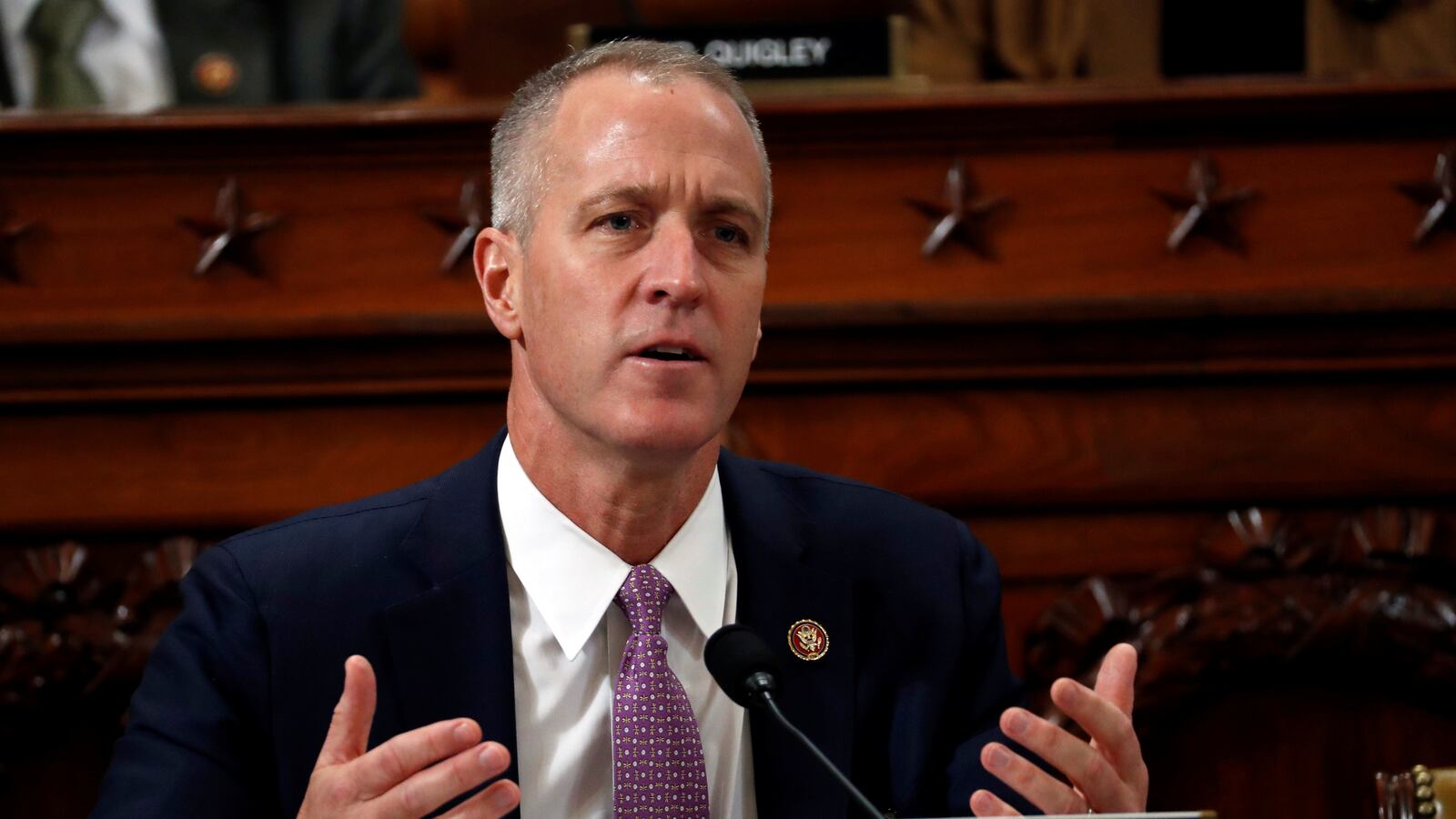This Friday, when New York finalizes its redrawn congressional maps, has suddenly become the most potentially explosive day of the election cycle for House Democrats.
By the time the dust settles, Democrats could be stuck with one of two unprecedented, uncomfortable internal party battles, thanks to a pileup of three incumbent lawmakers in the counties directly north of New York City.
At the center of the drama is Rep. Sean Patrick Maloney, head of the House Democratic campaign arm, who could be locked in an unprecedented primary battle with Rep. Mondaire Jones, a popular, first-term Black progressive. That fight would immediately call into question Maloney’s ability to fairly lead the Democratic Congressional Campaign Committee—which, among other things, seeks to retain Democratic incumbents—and bring in heavy hitters in progressive politics.
Alternatively, Jones could be squaring off with a fellow first-term Black progressive, Rep. Jamaal Bowman. That fight would split the party’s left wing unlike any other race in recent memory— —and generate optics on race that make basically every Democrat grimace.
And the threat to Jones and Bowman comes as progressives’ power in the House continues to expand—in ways leadership has found increasingly difficult to ignore.
No Democrat wants to see either of these outcomes, which could embroil the entire party in bruising and expensive factional warfare that distracts from their fight to overturn the New York maps—and their fight to keep the House.
The conflict unfolded swiftly after the draft maps were released Monday. Maloney quickly announced his intention to run in the new version of New York’s 17th District—pitting him against Jones.
That Democratic-leaning seat takes in much of the southern Hudson Valley region—and leaves behind most of Maloney’s current constituents further north, in the new 18th District, which is slightly less blue, and would lack an incumbent if Maloney leaves.
Maloney insisted on the move because he lives in his newly-chosen district—but so do 70 percent of Jones’ current constituents and many of his biggest supporters. Jones, meanwhile, saw his home in Westchester County become part of the new 16th District, which is Bowman’s turf, and he has committed to running there.
The DCCC chair is under pressure, in Washington and back home, to change course and run in the 18th—turf he has won before—but he has insisted that he will stick to his plan.
Fairly or not, the ball is now in Jones’ court, as he is the only member of the trio to have not stated his plans. After the maps are finalized Friday, he’ll likely have his decision.
Jones has criticized Maloney’s move, but has reportedly been feeling out a campaign against Bowman in the 16th District.
A Democratic lawmaker, who was granted anonymity to describe fluid discussions, said it was “50/50” as to whether Jones would run in against Maloney, or against Bowman.
If he ran against Maloney, the lawmaker said, Jones would have the sympathy of most members and strong support from the Progressive Caucus, the Black Caucus, and other key constituencies in the party. The conflict of interest concerns presented by that matchup would also put real pressure on Maloney to resign as chair of the DCCC, the lawmaker added.
But if he were to run against Bowman, Jones would be a less sympathetic figure, the lawmaker said, raising the prospect of long-term damage to his image.
Both of those nightmarish outcomes—and the public sniping and private drama unfolding now—is drowning out what many Democrats feel should be the party’s larger message: that the new maps, put into motion by a judge-appointed “special master” in a conservative county, are racially biased and should be struck down.
More broadly for Democrats, the intramural fighting—which could cost candidates millions of dollars—is the last thing they need in a 2022 election cycle in which Republicans are heavily favored to take control of the House.
The left wing of the party is livid at nearly every aspect of the situation. Some lawmakers are ready to call for Maloney’s resignation if he moves forward with his current plans.
Rep. Alexandria Ocasio-Cortez (D-NY) on Thursday told reporters it’s “particularly shameful as a member of Dem leadership [Maloney] cannot seem to take his redistricting on the chin.” She added she’d demand him to step down as DCCC if he proceeds with challenging another member.
Activists seem prepared to join calls for Maloney to step down, too.
“If you’re the head of the DCCC… you can’t abandon the district you largely represent to switch to a safer district,” said Leah Greenberg, co-chair of the progressive advocacy group Indivisible. “We think that if he continues with this course of action, he cannot continue to hold the DCCC role.”
Chris Hayden, a spokesperson for the DCCC, argued that Maloney has “proven he can lead the DCCC without his own race interfering and he will continue to do so.”
“Rep. Maloney fought harder than anyone to get maps that reflect the will of the people of New York, even at his own expense, and continues to fight against this illegitimate process,” Hayden said. The DCCC has weighed in against the New York maps during this week’s official comment hearing, and is leaving open the further action if they stand—potentially meaning lawsuits.
But Democrats’ chances of shifting the maps again—with the delayed primary scheduled for August—are not considered especially good. The impacted members could have to shift to primary warfare very quickly.
Two of them have recent experience winning those battles. Both Jones and Bowman were elected in 2020, and both entered their races intending to unseat longtime Democratic incumbents.
Bowman, backed by the left-wing group Justice Democrats, defeated former Rep. Eliot Engel by a wide margin. After former Rep. Nita Lowey retired, Jones easily beat out a crowded field of Democratic candidates to win the 17th District seat.
Since arriving in Congress, Bowman has aligned himself with the so-called “Squad” and is among the most left-wing members of the party. Jones is also staunchly progressive and has been vocal on issues like expanding the U.S. Supreme Court, but has also sought more traditional influence in the caucus. He was elected president of House Democrats’ freshman class last year.
Max Berger, a progressive operative who worked for Justice Democrats, cast Jones’ choice in stark terms from a progressive point of view.
While calling it “absolutely shameful” that Maloney would “kneecap” Jones, Berger tweeted that Jones he runs against Maloney, “the progressive movement will be united behind him.” If he runs against Bowman, “the progressive movement will be united against him.”
“Trying to take out Bowman would destroy any chance Mondaire ever had to gain national recognition, and likely end his career,” Berger said. “Terrible choice.”
In a statement to the Daily Kos on Thursday, Bowman made clear where he stood.
“[T]wo Black men who worked hard to represent their communities… should not be pitted against each other all because Congressman Sean Patrick Maloney wants to have a slightly easier district for himself,” he wrote. “ The solution is simple. Congressman Maloney should run in his own district. I’ll be running in mine.”
Bowman went further in an interview with the New York Times.
“He’s the chair of the DCCC. It's his responsibility to make sure Democrats stay in the majority,” he said. “To not run in 18th is to directly impact our ability to maintain the majority...You’ve got one job to do and you’re literally not doing that job."
Jones campaign did not return a call for comment.
Many Democrats, meanwhile, aren’t exactly itching to see Maloney go. Despite winning close elections in a purple district for much of his career, the former Bill Clinton advisor has carved out an identity as a progressive in the Hudson Valley region.
After Maloney announced his decision to run in the 17th, several local Democratic officials quickly endorsed him, demonstrating the muscle he could bring to a primary. The chairman of the Democratic committee in Putnam County, for instance, tweeted that “the new NY-17 couldn’t find a better representative than Sean.”
But if it were a choice between him and Jones, plenty of local progressives would go all-in on defeating the DCCC chair, said Meredith Wisner, chair of the left-wing Working Families Party in Rockland County.
“If Maloney decides to stay and force a primary here, I think he’d find it’d be difficult to get a lot of progressives behind his campaign,” Wisner said. “I don’t know how viable he is. Money doesn't equal winning.”
While Maloney would undoubtedly have a considerable campaign warchest, Jones knows how to win in the 17th District against better-funded opponents: in the 2020 primary, he defeated a candidate who spent $6 million by 25 points.
Jones would have an enticing matchup against Maloney, said a Democratic operative with experience in New York races. They anticipated that the organizing power of New York City’s left wing would eagerly go all-in on a chance to take out the DCCC chair, who has never been especially popular in those corners.
“The knives would be out for [Maloney],” the operative said, if he continues with his current position, which they called “mind-boggling.”
Amid scorching criticism from some of his colleagues, Maloney has defended his move by noting that Jones does not live in the 17th.
At a press conference this week, Maloney said, “from my point of view, I'm just running where I landed. If someone else is looking at the district as well, obviously we'll try and work through that as colleagues and friends.








